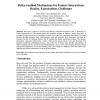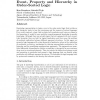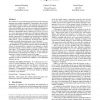299 search results - page 17 / 60 » Mechanizing common knowledge logic using COQ |
TIME
1994
IEEE
13 years 11 months ago
1994
IEEE
We describe a discrete time probabilitylogic for use as the representation language of a temporal knowledge base. In addition to the usual expressive power of a discrete temporal ...
CN
2004
13 years 7 months ago
2004
: This paper is based on the discussion during a panel that took place at the 7th Workshop on Feature Interactions in Telecommunications and Software Systems in Ottawa, Canada, Jun...
DLOG
2011
12 years 11 months ago
2011
W3C currently extends the SPARQL query language with so-called entailment regimes, which define how queries are evaluated using logical entailment relations. We describe a sound a...
ICLP
1999
Springer
13 years 11 months ago
1999
Springer
Knowledge representation in logics, even in the order-sorted logic that includes a sort hierarchy, tends to lose the conciseness and the nuances of natural language. If we could c...
TLDI
2010
ACM
14 years 4 months ago
2010
ACM
ML modules are a powerful language mechanism for decomposing programs into reusable components. Unfortunately, they also have a reputation for being “complex” and requiring fa...



